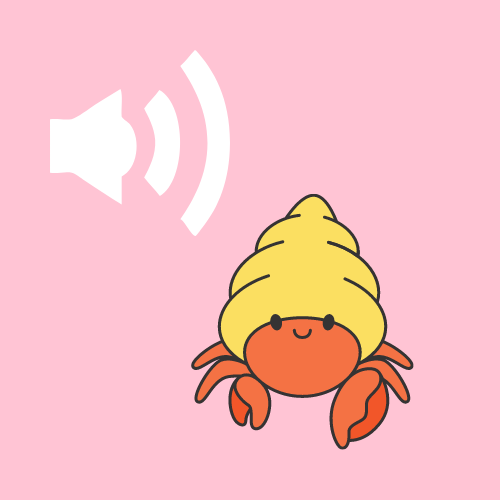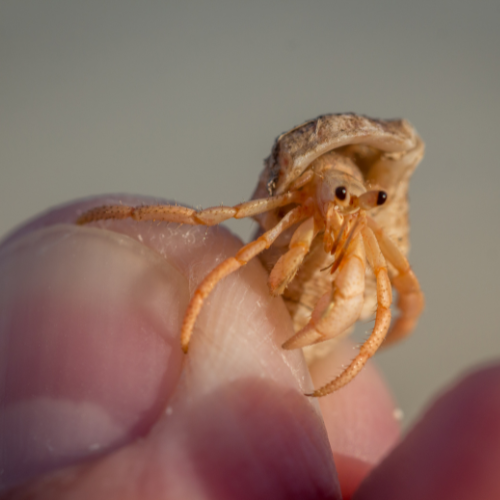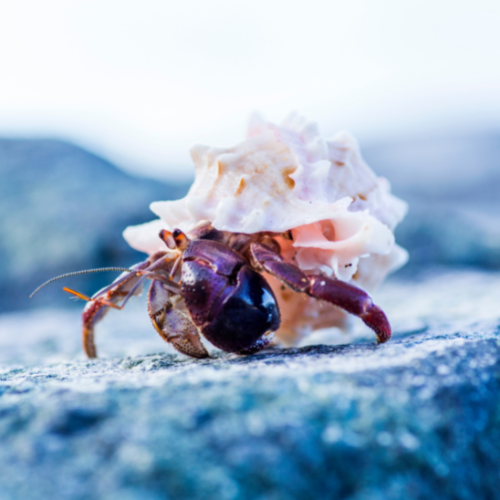When you hear your pet hermit crab chirping it can be quite distressing! You may have heard at some point a rather odd chirping sound. People generally refer to this sound as chirping but for me personally, I feel it sounds more like a croak similar to the noise a frog makes. However the name of this interesting sound is not important, what is important is why do hermit crabs chirp?
We are often left wondering what’s going on, and what the reason is that our hermit crabs are behaving like this. The truth is that hermit crab chirping is in most circumstances connected to negative and high-stress emotions such as aggression and fear. Today we are going to break down a couple of the most common reasons.

The majority of hermit crabs chirp when they are distressed or agitated, generally speaking, loud chirping is an unwelcome sound and indicates high emotions, mainly aggression. This high-pitched chirp is used as a warning to anyone who is causing our crab grief. Some times hermit crab noises can seem a bit of a mystery!
Try observing your hermit crabs if you ever get the chance when hearing this noise. The problem is often quite obvious when observing your crabs directly.
The Main Reasons Why Hermits Crabs Chirp [Explained]
These are examples from personal experience or examples given to me by people I’ve met through various forums related to hermit crabs.
Hermit Crabs Competing for Shells
In the hermit crab world fighting and competing for shells can be the difference between life and death. Without a suitable shell, a hermit crab is vulnerable and easy pickings for predators, so it’s essential that a hermit crab has the right shell. When life on death is on the line it’s easy to understand that hermit crabs are extremely stressed and resort to aggression in order to survive.

It’s common that when a hermit crab wants to steal another crab’s shell it will attack by hitting the back of the target’s shell. This often includes a great deal of chirping. Anything necessary to successfully evict a target from its shell.
During or Just Before Molting
When a hermit crab starts the process of molting it becomes extremely vulnerable. Letting your defenses down can be a stressful experience, especially for hermit crabs. Chirping in this situation can be identified as either aggression or fear depending on the specific hermit crabs’ mentality.
Feeling Endangered (In Any Way Shape or Form)
Hermit crabs are pretty simple in this respect. If they fear endangered from anything whatsoever they will react with the same simple fight or flight reaction which we see in most animals. Chirping is observed whether a hermit crab is acting aggressively or reacting in a fearful way.

When a Hermit Crab Feels Lonely
Hermit crabs are known to be social animals. Usually, you will find them living in large groups. So, you can imagine when they are left alone or isolated they will indeed get lonely. You can think of their chirps in this sense as a cry for help or even a call to their friends in an attempt to communicate. The obvious answer if you are experiencing a lonely crab is to get them some friends. But make sure to keep an eye on fighting.
Aggitation or Agression
If your hermit crabs are anything like mine you’ll know that they HATE to be bothered. Here are some examples of when I’ve experienced hermit crab chirping:
- Moving or handling hermit crabs (This depends on the specific crab but most dislike it)
- Crabs in the same tank will sometimes climb over each other.
- Sudden bright light, loud bangs, and crashes or vibrations.
When Food Is Present (Territorial Behavior)
Hermit crabs are known to be territorial animals and competitive when it comes to food. If this becomes a common issue it’s quite easy to solve by just splitting up the area in which you feed the crabs. I have to say it’s not often that my crabs will fight over food. You will however sometimes hear a hermit crab chirping at feeding time. This can be interpreted as a warning to other crabs who look to compete for food.
Asking For Help!
This usually happens when a hermit crab is stuck on its back. Although most of the time hermit crabs are able to flip themselves back over there are a couple of rare occasions where they will get stuck. The chirping in this situation is usually interpreted as a plea for help since hermit crabs have been known to work together to help each other. Others suggest this is a sign of panic its really hard to accurately understand the meaning but generally we can assume its a sign of distress.
Is Hermit Crab Chirping Bad?
Hermit crab chirping is usually a bad sign. Hermit crabs only really chirp loudly when they are scared or demonstrating aggressive behavior. Chirping is usually a warning to attackers to stay away. Usually the louder the chirping signifies how serious the situation is.
I personally don’t get too worried if I hear chirping from my hermit crabs unless it continues for a decent length of time. It’s always worth having a quick look just to see what’s going on and try to prevent it.

Hermit crab chirping isn’t ALWAYS bad, it’s thought some general communication takes place via chirping but in most cases, it’s usually aggression related. Many owners get mistaken about what chirping means for example; “chirping when feeding is a sign of happiness” when in reality it’s a warning to stay away from its food.
Hermit Crab Chirping is never a sign of happiness, unfortunately.
It’s also worth noting that sometimes hermit crabs can rub their shell against the side of the glass which sometimes can mimic the sound. I know this has worried some owners in the past who thought the noise was coming directly from the chirping. Again just keep an eye on what’s happening in your tank.
Do Hermit Crabs Make Noise?
Hermit crabs make a wide variety of noises when communicating with each other or when in danger. These sounds can range from snapping and clicking their claws to hissing and chirping. The exact purpose of any given noise can have multiple different meanings. Some specific hermit crabs produce high-pitched squeaks when disturbed.
Hermit crabs make noise via a process called stridulation. Stridulation is the process of rubbing different body parts together in order to create noise. For example, crickets make sounds by rubbing their leathery front wings together. This is similar to hermit crabs, they make noise by rubbing their legs together inside their shells.
Stridulation is most commonly associated with insects but there are a number of fish, crabs, snakes, and spiders that also use this technique to create sound. You can read more about how marine animals create noise in this awesome article.
Despite the variety of sounds produced by hermit crabs, they are generally not considered to be loud creatures and their noises are not typically heard by humans unless they are in close proximity.
How Do You Destress a Hermit Crab?
If your hermit crabs are always making noises there’s a high probability they are stressed out. For whatever reason it might be, you as a responsible owner have a duty to help your crabs live the best life possible. First, try to identify clearly what is causing the stress and remove or solve the issue. Follow this up by providing your crab some sand to burrow in. This will help your crab feel safe. Then finally give your crab some space and try to prevent interaction other than providing water and food.
What About Your Hermit Crabs?
Do you know why your hermit crabs chirp? Do you think it’s a good thing or a bad thing? Let us know in the comments. I’m interested to know what you guys think! If you enjoyed this article please check out more of our articles. We have lots of hermit crab content coming soon!

Doctor of Veterinary Medicine (D.V.M.) at Nation Taiwan University,Master of Science (M.S.) in Biomedical Engineering at National Taiwan University of Science and Technology




